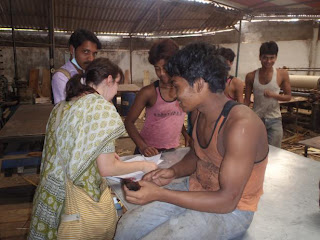So, for those of you who may think I'm just on vacation, I'm going to provide some proof that I'm actually working. I mentioned earlier that my field placement was at a Migrant Outreach program to help provide awareness, education and resources regarding HIV/AIDs. Basically, the focus of the project is reduce the the spread of HIV/AIDS by narrowing the focus to a high-risk population, migrant workers.
So, to do this, my program is divided into specific regions and each location goes out into their community and asks companies with migrant workers to agree to hold a medical camp at their work-site. If the company agrees then our program will set up a medical camp every 90 days at the work-site.
The medical camps allow migrant workers to see a doctor on-site and obtain any needed medications immediately. Although the medications are limited of course. Our staff will set up a table, usually in the middle of the work-site and workers may come up to the table and sign up to see the doctor. We register each worker and gather some basic demographic information so that information can be included in data analysis. Me and the other interns have been doing the registering of the migrants and have had to learn some Hindi to do it. None of the migrants speak English and because they are from different states, they know mostly Hindi. So I've been practicing my Hindi and although I still need a lot of practice, I can now communicate with some of the migrants on my own, limitedly of course.
 |
| Me attempting to speak Hindi to the workers |
 |
| Outreach workers registering Migrant workers to see the doctor. |
Also, while we are visiting each work-site, we may also conduct an HIV/AIDs awareness class as well as an educational video. This is all dependent upon what each company will allow to have at their work-site. Some companies may not allow an HIV/AIDs class to be taught. Condoms may also be given out at each work-site depending on whether the company permits it or not. Even if a company does not allow a class to be taught, there is still counseling provided to each individual before they see the doctor. This counseling involves asking specific questions to determine the HIV/AIDS risk level of each migrant. If the counselor determines that the migrant is a high-risk, they will refer them to an ICTC center, where free HIV testing is provided.
 |
| Our Counselor teaching a HIV/AIDs awareness class |
So far I think my internship is going well. It is great that my colleagues allow and encourage us interns to do hands-on work. It is sort of expected that we won't be doing much actual work here because of the language barrier, but so far I'm pretty happy with the amount of actual work I seem to be doing. I'm also working on gathering data from a questionairre that me and the other UMB students made. The questionairre is a survey we give to some of the migrants about their knowledge of HIV/AIDs, their behaviors, etc. I will basically be conducting a whole research study from scratch, which will be great experience.
Anyway, I apologize for the delay in posts. Hopefully my next post will come sooner and feel free to throw out suggestions! Now that classes are in full swing I feel my creative juices are waning...

I'm so proud of you! This is really amazing what you are doing for these people and the help/ information you are providing them. Blown away by the change you are implementing there; very amazing!!
ReplyDelete